Search
Showing 10 of 1954 results for NARSC 2016 conference registration fees student pre advance late July 2016
-
Government delegation from South Korea visits New Zealand to reconnect with several of our education providers
New Zealand and South Korea have strong education links and one unique partnership is the education cooperation under the Korea-New Zealand Free Trade Agreement (KNZFTA) which has historically included education programmes for Korean school and tertiary students.
The visiting delegation included representatives from the Korea Ministry of Food, Agriculture and Rural Affairs (MAFRA), the Korea Ministry of Oceans and Fisheries (MOF), the Korea Agency of Education, Promotion and Information Service in Food, Agriculture, Forestry and Fisheries (EPIS) and Korea Fisheries Resources Agency (FIRA), the implementing agency for the MOF-funded project.
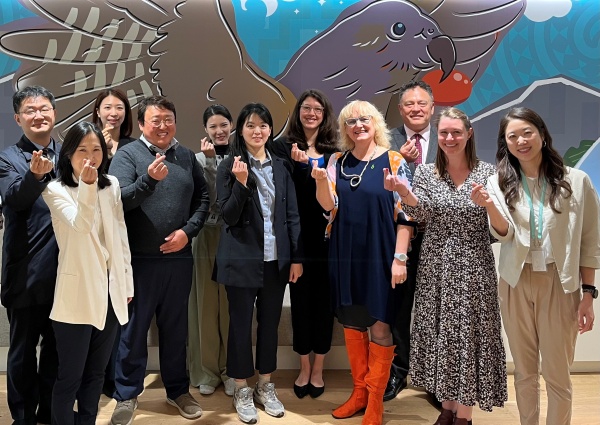
The delegation was welcomed to the ENZ Wellington office with a mihi whakatau on their first day. ENZ, Ministry of Education (MoE) and Ministry of Foreign Affairs and Trade (MFAT) colleagues joined together for waiata and kai with our Korean guests.
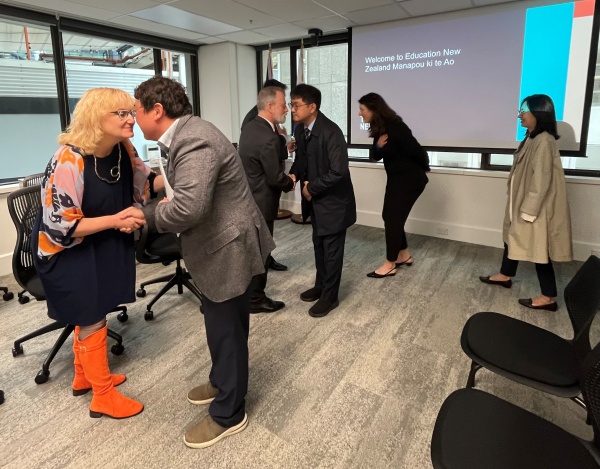
Following a welcome and mihi whakatau in Wellington, the group travelled on to Nelson where they visited Te Pūkenga Nelson Marlborough Institute of Technology (NMIT) and Nayland College. The visit to Nayland College was an opportunity for the Korean representatives to gain a better understanding of the pastoral care for school students and the unique offerings such as outdoor education and horticulture programmes.
Kay Lee, ENZ Senior Market Development Manager – Korea, said it was important for the Korean delegation to experience firsthand the welcoming and safe environment of New Zealand schools to regain confidence in the Schools Visits Programme.
“After the COVID-19 pandemic, the Korean Government was concerned about sending students, especially younger students, overseas to study particularly on scholarship programmes because parents wanted assurance their children will be well looked after. In the debrief with the Korean representatives, it was clear they gained confidence from speaking to the New Zealand institution representatives around the procedures and systems in place to support students.”
“We hope that this renewed confidence will mean that we start seeing Korean government scholarship school students studying in New Zealand again in the near future”.
High on the agenda during the delegation’s visit were the School Visits and Tertiary Training Programmes, both of which were affected significantly during the pandemic.
From 2016 –2019, the School Visits Programme provided 150 high school scholarships per year for South Korean students from rural areas to attend New Zealand schools for eight weeks. The Korean Government planned to continue the Schools Visits Programme with its own funding in 2020, however, the programme was cancelled due to travel restrictions during the pandemic.
An alternative programme was run by MAFRA and MOF from December 2022 which involved short-term English Language Training for school students in Korea with three New Zealand teachers travelling to Korea to teach English (Read about their experience here).The Korean organisers have decided to run the English language programme in Korea again with six New Zealand teachers traveling to Korea to teach English in January 2024.
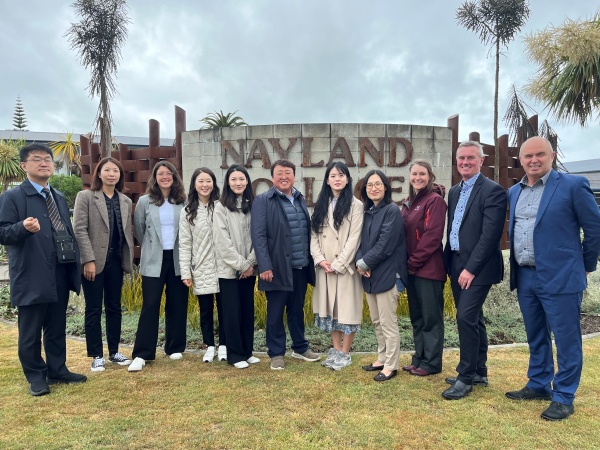
Nayland College demonstrated manaakitanga by welcoming the group to rainy Nelson but provided an Asia Kiwi lunch complete with meat pies and sushi!
Like the Schools Visits Programme, the pandemic interrupted tertiary programmes and the revised programme ran in January 2023 with short term group programmes. The site visits in November to Te Pūkenga NMIT and Lincoln University provided an opportunity to discuss the institutions’ proposals to host Korean tertiary students in January 2024.
Also discussed was the importance of reciprocity and it was noted that Korea is a popular destination for New Zealanders under the Prime Minister’s Scholarship for Asia (PMSA) scheme. Since 2016, the scheme has awarded scholarships to 196 individuals or groups for study, intern or research programmes in Korea. Lincoln University, in particular, has been successful in facilitating group PMSA programmes focused on agriculture to Korea.
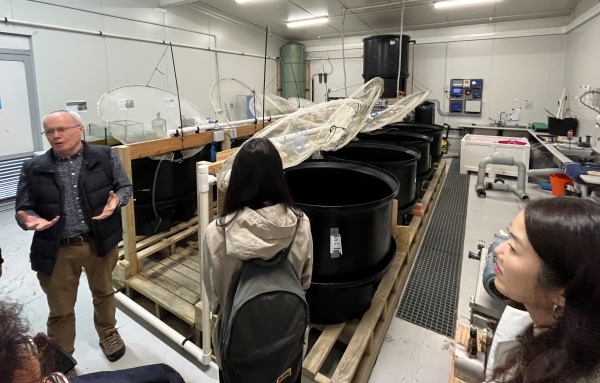
Dr Mark Burdass, Aquaculture Programme Coordinator and Tutor, introduces the hands on learning in the aquaculture programme at Te Pūkenga NMIT.
At the conclusion of their visit, the Korean delegation expressed their gratitude to the institution hosts for making their time in New Zealand memorable and valuable through fruitful discussions. The delegation emphasised the importance of conducting these meetings in person and visiting the campuses to meet with institution staff and academics. The ENZ Manapou ki te Ao team is pleased to continue close cooperation with our Korean education partners to facilitate connections with New Zealand education providers for the education programmes.
If you are interested in finding out more about the education initiatives originally outlined in the KNZFTA, you can read about this in a 2016 E-News article here - New opportunities for New Zealand and Korea.
-
Strengthening the international student experience
The true value of education starts with a great experience for the international students who choose New Zealand. These experiences help us to foster long-lasting connections with the rest of the world. These connections support the social, cultural and economic relationships New Zealand needs for its own prosperity.
In May we responded to allegations of visa fraud. With 125,000 international students studying in New Zealand last year, our industry is strong. To maintain the momentum we need sustainable growth. We all have a responsibility to make sure we have our settings right to attract the right students to the right programmes.
Education providers are at the heart of this. We have an industry of high performing institutions delivering outstanding programmes and products for domestic and international students. However, we acknowledge the concerns that have been expressed in the media around a small number of providers.
At Education New Zealand (ENZ) we are working more closely than ever before with our New Zealand government agencies. We are serious about our role in building a strong, sustainable international education system that works for New Zealand. We are committed to a joined up New Zealand Government approach to tackle issues of non-compliance which negatively impact on the exceptional contribution made by most of the 850 New Zealand providers enrolling international students.
ENZ welcomes the new code of practice for international students launched on 1 July as a way of strengthening provider engagement and responsibility for the student experience and with the agents New Zealand providers are working with.
Providers are the link between agents and student flows. We will be supporting providers to do the right thing, which the vast majority do, and continue working with other New Zealand government agencies for them to better understand where some providers may not be meeting these expectations. This will help us to help the industry safeguard our reputation as a world-class education destination and to protect the education brand that we have built together.
While market diversification is important for us, education markets like India are going to remain a critical part of our industry. Within the next five years India will have the largest tertiary-age population in the world with a middle class expected to grow to around 500 million. The demand for higher education is only going to continue to grow.
To be a part of this opportunity, we need to remain aspirational but we also acknowledge that we need to be smarter in how we operate.
We all need to be thinking long-term about what international education means to New Zealand. We are about sustainability, quality, value and integrity. We are about supporting mutual benefit and need to continually look at the value our own domestic students gain from international engagement. Done well, international education contributes hugely to our positioning in the global community.
Telling the international education story and showcasing the benefits it brings to New Zealand and New Zealanders is a top priority for ENZ. We encourage you to work with each other, your communities, and with us, to continue to highlight the value and vibrancy that international education brings to New Zealand.
John Goulter, Acting Chief Executive Education New Zealand
-
International Student Hardship Fund now fully allocated
The fund first opened for applications on 21 May. It was met with immediate interest by a wide variety of education institutions and community groups.
A cross-ENZ team named Kāhui Oranga was charged with the fund’s administration. They met twice weekly to go through applications and ensure a balanced allocation of funds between regions, sectors and institutions.
Education providers and community organisations are disseminating grants from the fund to international students in the form of cash grants, food parcels and accommodation support.
ENZ Director of Student Experience and Global Citizens, Sahinde Pala, led Kāhui Oranga. She says the government was glad to be able to offer international students tangible support in such an uncertain time.
“At ENZ we talk a lot about manaakitanga – the offering of hospitality and respect to guests. We really want every student that comes to New Zealand to feel valued,” she says.
“It was obvious once the impacts of COVID-19 began to be felt here that we needed to offer our international students most in need extra support during these difficult times.”
Last week, Deputy Prime Minister Winston Peters and Minister for the Community and Voluntary Sector, Poto Williams, announced the Assistance for Foreign Nationals impacted by COVID-19 Programme.
This $37.6 million fund will open on 1 July and be administered by the Department of Internal Affairs. International students experiencing serious hardship will be able to apply to this programme to receive support with basic needs such as food and accommodation.
-
Prime Minister welcomes international students
One of many welcome events around the country since our borders reopened at the end of July, the ceremony was attended by more than 70 students, as well as representatives of UoA and Education New Zealand Manapou ki te Ao (ENZ). It was an emotional moment for some of the students, who had been waiting a long time for the opportunity to study here.
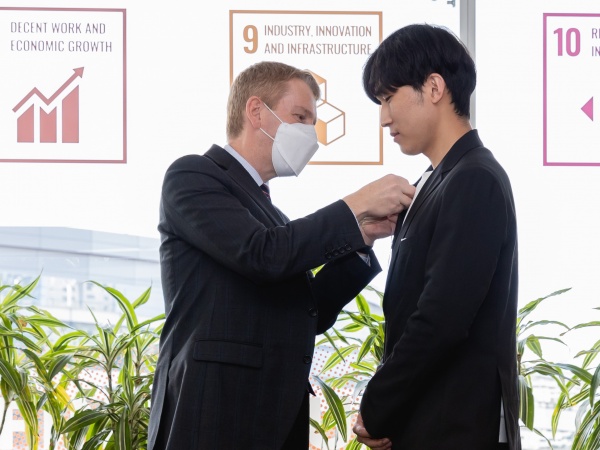
Minister Hipkins presenting a Tū Ngātahi pin to international student Kyeongmin Kang from English Language Academy
Tū Ngātahi pins were presented to international students Petchpiangpor Sueasuwan from Western Springs College; Kyeongmin Kang from English Language Academy; and Ankeeta Karmakar from UoA by the Prime Minister, Minister Hipkins and UoA Vice-Chancellor, Professor Dawn Freshwater respectively.
ENZ Chief Executive Grant McPherson explained the significance of the Tū Ngātahi pins, which you can read more about here.
The formal welcome was followed by morning tea, with further exchanges of Tū Ngātahi pins and opportunities for photographs.
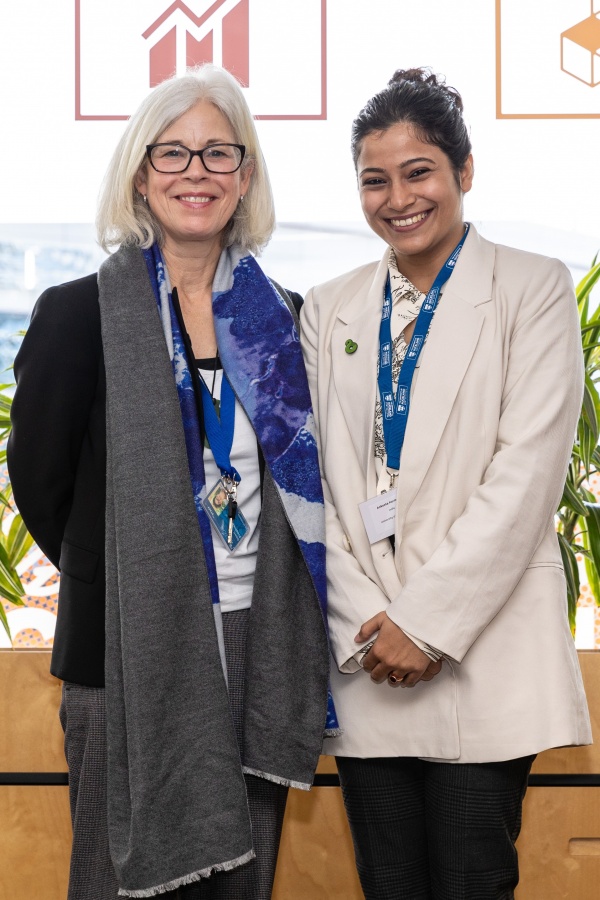
Professor Dawn Freshwater, Vice-Chancellor at University of Auckland, with university student Ankeeta Karmakar.
International student Malina Grube from the University of Auckland spoke about her experiences here, and her involvement in the kākahu project.
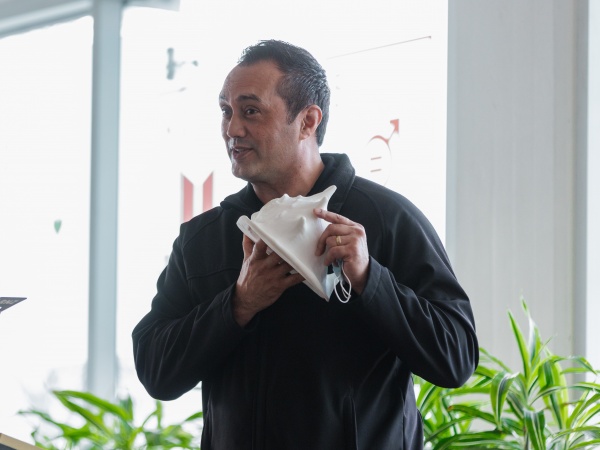
Michael Steedman, Kaiarataki at the University of Auckland, demonstrated a 3D-printed conch shell as part of his welcome to guests – a metaphor for new arrivals and new opportunities.
-
69,000 international student enrolments in 2023
The latest figures show that there were 69,135 international student enrolments* with New Zealand education providers in 2023. This represents a 67 per cent increase compared to the full year in 2022 and 60 per cent of annual enrolments in 2019.
“Over 69,000 enrolments from international students all over the world is good news for our education sector and positive for our communities,” said Dr Linda Sissons, Acting Chief Executive of Education New Zealand Manapou ki te Ao.
“It confirms that New Zealand is an attractive place to study, offering a quality learning experience inside and outside the classroom in a safe, welcoming environment.”
“New Zealand is a small country and for many students, rubbing shoulders with people from other cultures gives them a greater understanding of the issues facing our complex world. In this time of fragile geopolitics, the melting pot of campus life can help build greater understanding and tolerance.”
The university subsector saw the strongest recovery with 29,065 students, representing 86 per cent of 2019 enrolments. Universities and schools are New Zealand’s two largest subsectors for international students.
International student enrolments have grown compared to 2022 in all subsectors except wānanga. English Language Schools saw the greatest percentage increase in international enrolments, lifting by 511 per cent from 1,565 to 9,570.
As with all New Zealand’s competitors in the international education sector, China is the largest source market for international students at 35 per cent.
India is second largest at 11 per cent, Japan at 10 per cent, South Korea at five per cent and Thailand at four per cent. Of the other source countries, no other country represented more than four per cent of total enrolments.
“Enabling a thriving and globally connected New Zealand through world-class international education is a government priority. We are actively diversifying our recruitment efforts to reach international students in a broad range of countries,” Dr Sissons said.
More information on enrolment numbers can be found here.Note: * One individual may enrol more than once
For further information:
Justin Barnett | Director of Communications, Education New Zealand
+64 21 875 132
About Education New Zealand (ENZ) https://www.enz.govt.nz/
Education New Zealand Manapou ki te Ao (ENZ) is the government agency dedicated to helping Aotearoa New Zealand realise the social, cultural, and economic benefits of international education. Our role is to promote New Zealand as a high-quality education destination offering excellent education and students experiences and to encourage New Zealand students to study overseas.
With approximately 110 staff in 16 locations around the world, ENZ works closely with New Zealand’s diverse education sector which includes schools, English language providers, Private Training Establishments, Institutes of Technology and Polytechnics (Te Pūkenga), and universities. Internationally, we work with a range of education stakeholders, including government agencies and education providers to identify and encourage sustainable growth opportunities for New Zealand’s education sector.
This page was last updated on 23 July 2024.
-
Draft International Education Strategy released
A group of about 75 international students and staff, along with representatives of education providers and key local and central government agencies, were present at Auckland University of Technology last Friday where Tertiary Education, Skills and Employment Minister Paul Goldsmith officially launched the draft strategy.
The draft strategy sets out the government’s vision that international education will continue to contribute to a vibrant and prosperous New Zealand, and outlines the proposed actions the government will take to support a sustainable, high quality international education sector that delivers net benefits to New Zealand.
 The draft strategy was developed with input from the wider sector, including an online survey and a series of workshops in 2016, to identify future challenges and opportunities. ENZ and the Ministry of Education are leading the strategy development.
The draft strategy was developed with input from the wider sector, including an online survey and a series of workshops in 2016, to identify future challenges and opportunities. ENZ and the Ministry of Education are leading the strategy development. The draft strategy can be found here, alongside options for providing feedback, including an online survey, a series of workshops for the sector, and a session on the draft strategy during the NZIEC conference in August.
We welcome feedback on the draft strategy and the vision, goals and actions that it recommends. Consultation will close on 31 August 2017. The strategy will be finalised and an implementation plan developed for launch towards the end of the year.
Thank you to everyone who has participated in this work to date, and we look forward to hearing your thoughts on the draft strategy.
-
New deal will bring over a million New Zealand books to Chinese schools
To bring the books to China, Global Education Systems (GES) is working in partnership with a leading Chinese foreign languages publisher, Foreign Language Teaching Research Publishing (FLTRP).
The series, which includes both hard copy and digital books, will support existing government text books for English language learners in Chinese schools.
“We aim to equip students in China with a burning desire to become life-long readers and writers in English,” said GES Director Tracy Strudley.
“The focus of our material is to engage students with meaningful texts that teach in-depth language comprehension and writing.”
The deal marks the largest print run for an Australasian education publisher to date – totaling 1.632 million books.

The series was developed by author and GES Product Development and Education Director Jill Eggleton QSO. Eggleton was the 2015 recipient of the Storylines Margaret Mahy Medal for lifetime achievement and an outstanding contribution to New Zealand children’s literature and literacy.
“The Key Links series is well designed and follows many of the requirements in the newly released National Curriculum,” said Zhang Lixin, Director of FLTRP’s Basic Education Publishing Division.
Eggleton, Strudley and Steve Jones, NZ Trade Commissioner based in Guangzhou, will travel to Shenzhen on 17 April for the launch of the Key Links series at a foreign language teaching conference. Some 400 administrators and teachers across China will receive training in the Key Links Literacy learning approach ahead of a May release into Henan province schools.
Negotiations between GES and FLTRP began during a trade mission sponsored by Education New Zealand in June 2016.
Education technology is an important, and growing contributor to the trade relationship between China and New Zealand.
-
Investment in growing academic mobility with South America
ENZ invites proposals for new research
ENZ and Brazil’s São Paulo Research Foundation (Fundação de Amparo à Pesquisa do Estado de São Paulo – FAPESP) are jointly funding new research projects to encourage academic cooperation and mobility between our countries.
Each is contributing $100,000 to enable eight or more established academic researchers across all fields, to conduct research in the other’s country. The first year of the funding agreement will act as a pilot.
FAPESP is a public foundation with a mission to support research projects in higher education and research institutions, in all fields of knowledge.
As part of the agreement with FAPESP, successful applicants from New Zealand will develop their projects in cooperation with researchers in Brazil. The researchers will then travel to Brazil to undertake the research with their partners. Brazilian researchers will be funded to come across to New Zealand in turn.
ENZ General Manager International, Lisa Futschek, says the funding collaboration will create opportunities for New Zealand researchers that did not exist before.
“South America is a key market for Education New Zealand – particularly in relation to outbound academic mobility. This new funding collaboration showcases ENZ's commitment to creating new pathways for New Zealand institutions with South America."
This announcement builds on years of relationship-building, and an agreement with Universities New Zealand (UNZ) in November 2016 to enhance cooperation, enable academic mobility and encourage the exchange of knowledge between participating higher education institutions.
ENZ Senior Market Development Manager – Brazil, Ana Azevedo, says: “The professors and researchers that will be involved in these research projects will have the opportunity to play a vital part in driving this relationship forward. They will be ambassadors for their university and New Zealand.”
Applications for funding are open now and close on 27 January 2020.
Download the application guidelines
Universities explore deepening 'south-to-south' connection with delegation
This October, senior academics and researchers from all eight New Zealand universities took part in a 10-day visit to Colombia and Brazil. The delegates explored options to collaborate in new areas such as pharmaceutical sciences and build on previous historical collaboration in areas such as agri-business.
In Colombia, the delegation were part of the official New Zealand presence at Conference of the Americas on International Education (CAIE-CAEI).
“At CAIE-CAEI, members of the delegation spoke on a panel to highlight areas of ‘south to south’ academic collaboration between Latin American and New Zealand universities,” says ENZ Regional Director – Americas and Europe, Amy Rutherford.
In Brazil, the delegation met with the Oswaldo Cruz Foundation (“Fiocruz”), the most prominent health-focused science and technology institute in Latin America.
They also visited the University of Campinas (UNICAMP) and São Paulo State University (UNESP). At UNESP, the programme included meetings with Brazilian academics from universities across the country, including the Federal University of Minas Gerais (UFMG), the Federal University of Rio Grande do Sul (UFRGS), the Federal University of Parana (UFPR), the Federal University of Rio de Janeiro (UFRJ), and the University of São Paulo (USP).
In both Colombia and Brazil, the delegations participated in ‘Innovation and Education in New Zealand’ seminars for students, where they met with undergraduate and postgraduate students interested in studying in New Zealand. These seminars were co-hosted by members of the Universities New Zealand (UNZ) Latin America Elite Agent programme.
“I was pleased to see the high calibre of the New Zealand, Colombian and Brazilian academics and researchers who came together during the 10-day programme," Rutherford says. "The future of New Zealand-Colombia and New Zealand-Brazil academic and research collaboration looks bright!”
 The delegation at the New Zealand booth at CAIE-CAEI in Bogotá, Colombia. L-R: Ellen Duval, Deputy Head of Mission and Consul, Embassy of New Zealand in Colombia; Jairo Gutierrez, Acting Head of School (Engineering, Computer and Mathematical Sciences), Auckland University of Technology; Amy Rutherford, Regional Director – Americas and Europe, ENZ; Richard Watt, Professor and Head of Department of Economics, College of Business and Law, University of Canterbury; Constanza Tolosa, Senior Lecturer, School of Curriculum and Pedagogy, Faculty of Education, University of Auckland; John Lowry, Senior Lecturer – School of People, Environment and Planning, Massey University; Margaret Anderson, Deputy Director, International, University of Waikato; Lucy Duncan, New Zealand Ambassador to Colombia; Javiera Visedo, Senior Market Development Manager – Colombia and Chile, ENZ; Joel Tyndall, Associate Professor, School of Pharmacy and Associate Dean International, Division of Health Sciences, University of Otago; Shane Ball, International Marketing Manager, University of Auckland and VP Latin America New Zealand Business Council; Benedikt Fischer, Hugh Green Foundation Chair in Addiction Research, and Professor, Schools of Population Health and Pharmacy, Faculty of Medical and Health Sciences, University of Auckland; Ana Azevedo, Senior Market Development Manager – Brazil, ENZ.
The delegation at the New Zealand booth at CAIE-CAEI in Bogotá, Colombia. L-R: Ellen Duval, Deputy Head of Mission and Consul, Embassy of New Zealand in Colombia; Jairo Gutierrez, Acting Head of School (Engineering, Computer and Mathematical Sciences), Auckland University of Technology; Amy Rutherford, Regional Director – Americas and Europe, ENZ; Richard Watt, Professor and Head of Department of Economics, College of Business and Law, University of Canterbury; Constanza Tolosa, Senior Lecturer, School of Curriculum and Pedagogy, Faculty of Education, University of Auckland; John Lowry, Senior Lecturer – School of People, Environment and Planning, Massey University; Margaret Anderson, Deputy Director, International, University of Waikato; Lucy Duncan, New Zealand Ambassador to Colombia; Javiera Visedo, Senior Market Development Manager – Colombia and Chile, ENZ; Joel Tyndall, Associate Professor, School of Pharmacy and Associate Dean International, Division of Health Sciences, University of Otago; Shane Ball, International Marketing Manager, University of Auckland and VP Latin America New Zealand Business Council; Benedikt Fischer, Hugh Green Foundation Chair in Addiction Research, and Professor, Schools of Population Health and Pharmacy, Faculty of Medical and Health Sciences, University of Auckland; Ana Azevedo, Senior Market Development Manager – Brazil, ENZ.
The delegation at the Innovation and Education in New Zealand seminar in São Paulo, Brazil. L-R: Benedikt Fischer, Hugh Green Foundation Chair in Addiction Research, and Professor, Schools of Population Health and Pharmacy, Faculty of Medical and Health Sciences, University of Auckland; James Carson, Senior Lecturer, Assistant Dean, School of Engineering, University of Waikato; John Lowry, Senior Lecturer – School of People, Environment and Planning, Massey University; Arun Elias, Associate Dean International and Accreditation, Victoria University of Wellington - Wellington School of Business and Government ; Javiera Visedo, ENZ Senior Market Development Manager – Colombia and Chile, ENZ; Ana Azevedo, Senior Market Development Manager – Brazil, ENZ; Chris Langley, New Zealand Ambassador to Brazil; Hugh Bigsby, Dean, Faculty of Agribusiness and Commerce, Lincoln University; Richard Watt, Professor and Head of Department of Economics, College of Business and Law, University of Canterbury; Joel Tyndall, Associate Professor, School of Pharmacy and Associate Dean International, Division of Health Sciences, University of Otago; Margaret Anderson, Deputy Director, International, University of Waikato; Amy Rutherford, Regional Director – Americas and Europe, ENZ; Vinicius Barreto, CEO, AC.
-
New social media launch in China
“Last year our awareness levels in China grew 17 per cent between April and December,” says Kathryn McCarrison, General Manager Marketing and Channel Development.
“With year-on-year growth in enrolments and student visa approvals from China, we want to continue building on this momentum in a top priority market for New Zealand.”
The number of Chinese students studying at a New Zealand institution was up 3 per cent in 2013 on 2012 and this growth looks set to continue, with student visa approvals from January to March this year increasing by 24 per cent.
In August new ‘Study New Zealand’ Weibo and WeChat sites will launch, targeting a youth audience with fun, informative and interactive content about studying in New Zealand.
Weibo is a microblogging platform, similar to both Twitter and Facebook, with more than 129 million monthly active users and more than 61 million average daily active users. Described by Forbes magazines as the world’s most powerful app, WeChat is a similarly popular mobile messaging app used by more than 350 million monthly active users.
The China team will continue to support the Ministry of Foreign Affairs and Trade Embassy’s Weibo account – supplying all-important content about bilateral education and research collaborations which demonstrate the depth of New Zealand’s strong education relationship with China.
“We are focused on profiling the dual opportunities New Zealand offers to China, as a high-quality and committed strategic education partner for our education products and services, and as an exceptional study destination,” says Alex Grace, Regional Director – Greater China.
Whereas social media activity will reach a wide audience, recent campaign activity in China was targeted at those actively considering studying abroad, particularly at university level.
The campaign, which remains active until the end of July, matched prospective students to an agent to find out more information about studying in New Zealand.
To date, over 6,500 prospective students have registered to find out more about New Zealand and these enquiries are being actively followed up by four agencies, who will in turn provide these qualified leads to New Zealand institutions.
-
New campaign sparks student network
“International students tell us that studying in New Zealand is an experience that changes them for the better – not only because of the great education they receive but also because they get to enjoy our unique environment and lifestyle,” says General Manager Marketing and Channel Development Hannah Lee-Darboe.
“When you’re away from home, sometimes all you want to be able to do is show your friends just what it’s like – to have them right there beside you for a while. We’re offering that opportunity to international students currently in New Zealand.”
The campaign offers students the chance to invite a friend from their home country to join them here for a 10 day all-expenses-paid study adventure.
Students visit studyin.nz to enter, and invite their friends to register their interest in visiting them. Entries are open until 25 May. Five student pairs will be shortlisted, with the winning pair selected and their itinerary built by audience vote. The study adventure will take place in July.
“We all connect through communities and networks. This campaign activates these channels and puts New Zealand on the radar of the friends and families of students currently studying in New Zealand,” says Hannah.
Selected institutions are also raising awareness of the competition through their channels.
The campaigns builds on the recently-announced partnership with the global networking organisation Kea.
“International education fosters global connections. We’re connecting New Zealand to the world through education, from studying through to graduation and beyond.”

